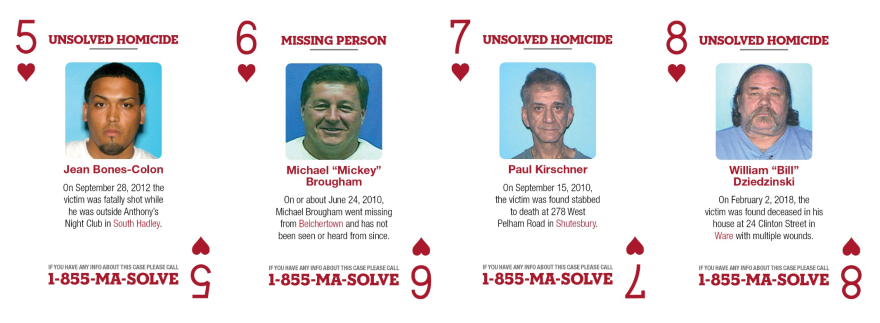The Massachusetts State Police have joined with district attorneys to seek clues in unsolved crimes — by creating a deck of playing cards.
The card decks are being distributed to state prisons, where — the hope is — people behind bars may come forward with information on unsolved homicides and missing person cases.
Each of the 52 cards includes a photo of a victim, basic information on the crime - and a hotline number.
Several other states already use playing cards to gather information on unsolved cases. The Massachusetts State Police Unresolved Cases Unit, which is spearheading the project, said this is the first time they've used the technique.
Amanda Dziedzinski's father-in-law Bill was found murdered in 2018 in Ware.
"I will take anything, absolutely anything, to try to bring some kind of answer, justice," Dziedzinski said. "Even a little inkling of truth."
Dziedzinski said her father-in-law had recently retired from a hospital custodial job when he was stabbed in the home he shared with his girlfriend. She said the DA's office has told the family very little about the investigation, and it's been excruciating.
"It's very hard to come to grips that we may never know what happened," she said. "It really messes with your mind because ... we live in this community and to know that someone stole another person's life, took so much from our family, and they are potentially still walking the streets, living their life."
So when the DA's office asked the family last year if they would mind Bill Dziedzinski’s face being included in the deck of playing cards, "I thought it would be great because, you know, there's some people in correctional facilities that could possibly know something, have a connection to our family."
"There's really no downside, there's nothing to lose," said prosecutor Steven Gagne with the Northwestern District Attorneys office.
Gagne's office submitted the Dziedzinski case and three others from Hampshire County for the Massachusetts card deck. He said they were the most recent unsolved cases, from 2010 to 2018.
Gagne said it is a long shot to think the playing cards would lead to viable suspects, especially since inmates may be looking for a deal to reduce their own sentences.
"So any tips that come in, we have to view with a healthy dose of skepticism," he said. "We have to scrutinize that information very carefully and we're not going to go off just willy-nilly charging somebody because somebody behind bars says they know something."
Still, Gagne said people sometimes come forward because something jogs their memory or because the reasons they didn't speak up before — be it fear or intimidation — are no longer in play.
Connecticut first created a card deck for unsolved cases in 2010. According to that state, they've released four new editions, which helped solve several old cases.



